
The dusky dolphin is a dolphin found in coastal waters in the Southern Hemisphere. Its specific epithet is Latin for "dark" or "dim". It is very closely genetically related to the Pacific white-sided dolphin, but current scientific consensus holds they are distinct species. The dolphin's range is patchy, with major populations around South America, southwestern Africa, New Zealand, and various oceanic islands, with some sightings around southern Australia and Tasmania. The dusky dolphin prefers cool currents and inshore waters, but can also be found offshore. It feeds on a variety of fish and squid species and has flexible hunting tactics. The dusky dolphin is known for its remarkable acrobatics, having a number of aerial behaviours. The status of the dolphin is unknown, but it has been commonly caught in gill nets.

The eyebrowed thrush is a member of the thrush family Turdidae. It breeds in dense coniferous forest and taiga eastwards from Siberia and Mongolia to Japan. It is strongly migratory, wintering south to China and Southeast Asia. It is a rare vagrant to western Europe.

The genus Dendragapus contains two closely related species of grouse that have often been treated as a single variable taxon. The two species are the dusky grouse and the sooty grouse. In addition, the spruce grouse and Siberian grouse have been considered part of this genus.

The dusky grouse is a species of forest-dwelling grouse native to the Rocky Mountains in North America. It is closely related to the sooty grouse, and the two were previously considered a single species, the blue grouse.

The New Zealand plover is a species of shorebird found only in certain areas of New Zealand. It is also called the New Zealand dotterel or red-breasted dotterel, and its Māori names include tūturiwhatu, pukunui, and kūkuruatu.

The common kusimanse, also known as the long-nosed kusimanse or simply kusimanse, is a small, diurnal member of the Mungotinae.

The dusky shark is a species of requiem shark, in the family Carcharhinidae, occurring in tropical and warm-temperate continental seas worldwide. A generalist apex predator, the dusky shark can be found from the coast to the outer continental shelf and adjacent pelagic waters, and has been recorded from a depth of 400 m (1,300 ft). Populations migrate seasonally towards the poles in the summer and towards the equator in the winter, traveling hundreds to thousands of kilometers. One of the largest members of its genus, the dusky shark reaches more than 4 m (13 ft) in length and 350 kg (770 lb) in weight. It has a slender, streamlined body and can be identified by its short round snout, long sickle-shaped pectoral fins, ridge between the first and second dorsal fins, and faintly marked fins.

The dark fruit-eating bat, is a bat species from South America.

Bagrichthys is a genus of bagrid catfishes.

The dusky leaf monkey, also known as the spectacled langur or the spectacled leaf monkey, is a species of primate in the family Cercopithecidae. It is found in Peninsular Malaysia, Myanmar and Thailand, and can occasionally be found in Singapore. During the day, these small, folivorous primates divide in sub-groups and forage for vegetation and fruit throughout the tropical forests. According to the IUCN, the dusky leaf monkey's population is declining due to habitat loss, poaching, and anthropogenic land use, which prompted the IUCN to classify the species as endangered in 2015.

The California chipmunk or chaparral chipmunk is a species of rodent in the squirrel family Sciuridae. It is found in Baja California, Mexico, and in southern California in the United States.
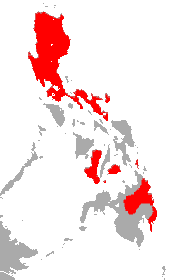
The Philippine forest roundleaf bat is a species of bat in the family Hipposideridae. It is endemic to the Philippines.

The Appalachian cottontail is a species of cottontail rabbit in the family Leporidae. It is a rare species found in the upland areas of the eastern United States.
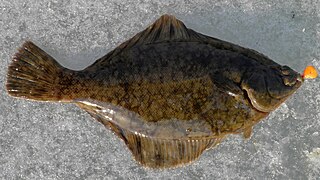
Pseudopleuronectes obscurus, or dark flounder is a flatfish of the family Pleuronectidae. It is a demersal fish that lives on salt bottoms in the temperate waters of the northwestern Pacific, from Hokkaido to the Kuril Islands, the Sea of Okhotsk, Sakhalin and the Tatar Strait to the northeastern coast of Korea and the Yellow Sea. It can grow up to 56 centimetres (22 in) in length, though it more commonly reaches around 35 centimetres (14 in), and its maximum recorded weight is 2.6 kilograms (5.7 lb).

Helochares is a genus of water scavenger beetles in the family Hydrophilidae, represented by 161 described species. It is distributed across the Afrotropical, Australasian, Indo-Malayan, Nearctic, and Palearctic realms.
Helochares normatus is a species of water scavenger beetle in the family Hydrophilidae. It is found in Central America and North America.
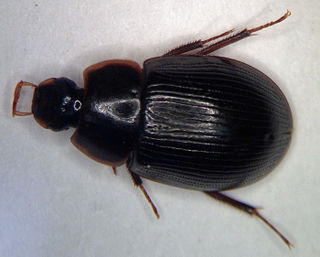
Helochares maculicollis is a species of water scavenger beetle in the family Hydrophilidae. It is found in North America.
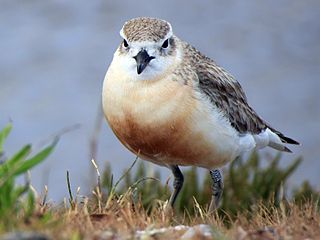
The northern New Zealand dotterel or northern red-breasted plover is a shorebird which breeds exclusively on beaches in New Zealand's North Island.
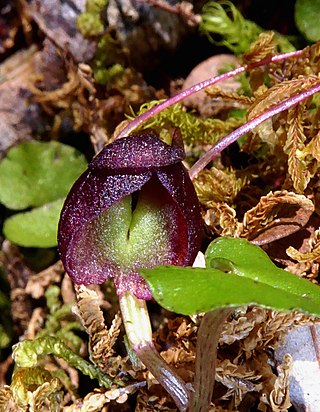
Corybas obscurus is a species of terrestrial orchid endemic to New Zealand. It has a solitary heart-shaped leaf and a deep crimson or nearly black flower and is part of the Corybas trilobus aggregate.

Sindolus is a Neotropical genus of water scavenger beetles in the family Hydrophilidae represented by eight described species, ranging from Mexico to Argentina, and including one species recorded from Antigua in the Lesser Antilles.


















